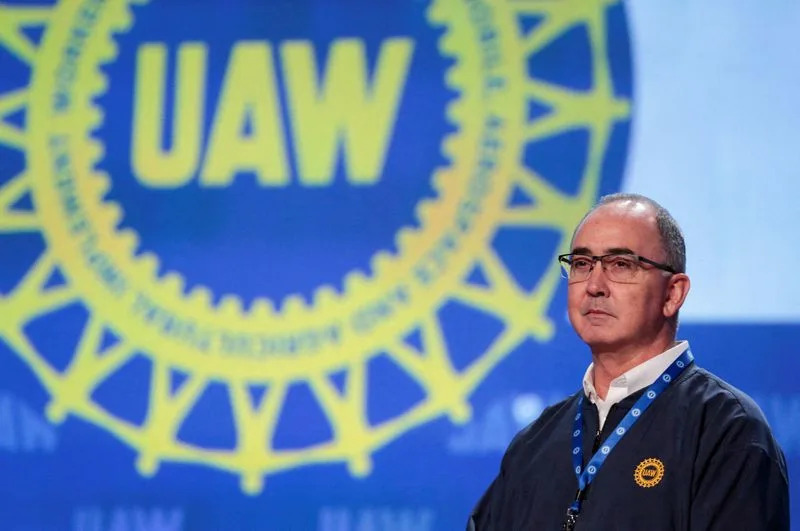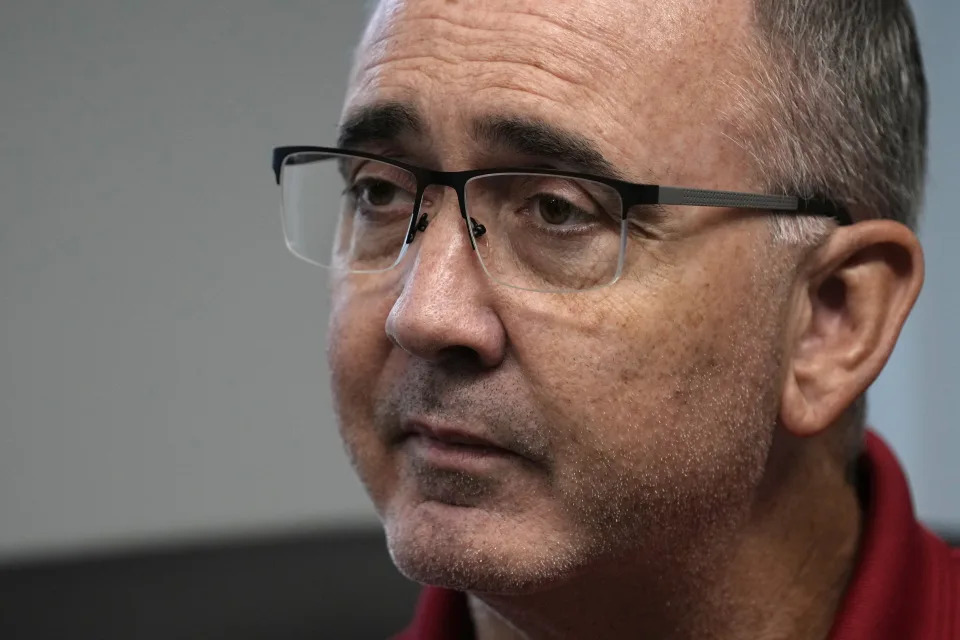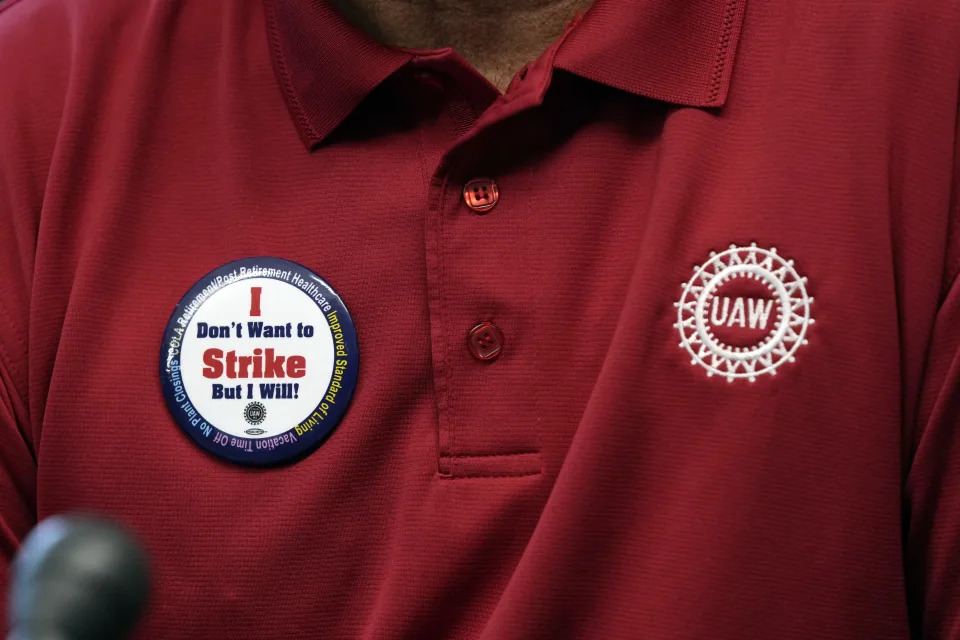David Shepardson
Wed, September 6, 2023

OTO: UAW President Shawn Fain chairs the 2023 Special Elections Collective Bargaining Convention
(Reuters) -The United Auto Workers (UAW) union on Wednesday made a labor contract counterproposal on economic issues to Ford Motor, while Chrysler parent company Stellantis planned its counteroffer this week.
Talks are heating up ahead of the expiration on Sept. 14 of the current four-year labor agreements covering 146,000 workers at the Detroit Three automakers. The UAW has said 97% of members voted in favor of authorizing a strike if agreement is not reached.
"They chose to follow the same path they have in the past, which is delay, delay," UAW President Shawn Fain told CNBC Wednesday night. "They waited now until the last eight days to want to start talking -- so we've got a lot of work to do."
Last week, Ford said it had offered a 9% wage increase through 2027, much less than the 46% wage hike being sought by the union. The UAW expects to receive a proposal from General Motors on Thursday, a source told Reuters, who spoke on condition of anonymity. GM confirmed it will meet with the UAW Thursday but declined to provide any details.
Stellantis said on Wednesday it intends to give the UAW a counter offer on the union's economic demands by the end of the week.
Ford said Wednesday it continues to negotiate with the UAW but declined comment on details of the talks.
Last week, the UAW filed unfair labor practice charges with the National Labor Relations Board against GM and Chrysler-parent Stellantis, saying they refused to bargain in good faith.
The union's demands include a 20% immediate wage increase followed by four 5% annual wage hikes, defined-benefit pensions for all workers, 32-hour work weeks and additional cost of living hikes.
The UAW also wants all temporary workers at U.S. automakers to be made permanent, enhanced profit sharing and the restoration of retiree health-care benefits and cost-of-living adjustments.
The UAW said Ford wants no cap on temporary workers and that those workers would not participate in profit sharing, would earn less than 60% of the top wage rate for permanent workers and receive inferior health-care benefits.
Ford said it would boost starting pay for temporary workers to $20 an hour, up 20%, and offer permanent employees $12,000 in cost-of-living adjustments over the contract.
The UAW said Ford's profit-sharing formula change would have cut payouts by 21% over the last two years, while Ford said it was offering a $5,500 signing bonus upon the contract's ratification for permanent and temporary workers.
(Reporting by David Shepardson; editing by Jonathan Oatis and David Gregorio)
UAW chief: Union to strike any Detroit automaker that hasn't reached deal as contracts end next week
TOM KRISHER
Updated Wed, September 6, 2023


United Auto Workers President Shawn Fain is interviewed, Wednesday, Sept. 6, 2023, in Detroit. Fain, who won the UAW’s presidency this spring in the first direct election by members, says the union plans to go on strike against any Detroit automaker that doesn't have an agreement by the time contracts expire next week.
(AP Photo/Carlos Osorio)
DETROIT (AP) — The head of the United Auto Workers warned Wednesday that the union plans to go on strike against any Detroit automaker that hasn't reached a new agreement by the time contracts expire next week.
“That’s the plan,” President Shawn Fain responded when asked if the union would strike any of the companies that haven’t reached a tentative deal by the time their national contracts end.
A strike against all three major automakers — General Motors, Stellantis and Ford — could cause damage not only to the industry as a whole but also to the Midwest and even national economy, depending on how long it lasted. The auto industry accounts for about 3% of the nation's economic output. A prolonged strike could also lead eventually to higher vehicle prices.
In an interview with The Associated Press, Fain left open the possibility of avoiding a strike. He acknowledged, more explicitly than he has before, that the union will have to give up some of its demands to reach agreements. Contracts with the three companies will all expire at 11:59 p.m. Sept. 14.
“There’s a lot of back and forth in bargaining," he said, "and naturally, when you go into bargaining, you don’t always get everything you demand. Our workers have high expectations. We made a lot of sacrifices going back to the economic recession.”
In the interview, Fain did report some progress in the negotiations, saying the union will meet Thursday with GM to hear the company’s response to the UAW’s economic demands. In addition, discussions are under way with Ford on wages and benefits. Stellantis, formerly Fiat Chrysler, has yet to make a counteroffer on wage and benefit demands, he said.
Stellantis said it will give the union a wage-and-benefit counteroffer by the end of the week, while Ford said it has a strong track record of creative solutions with the UAW. GM confirmed that it would meet Thursday with union representatives but wouldn't comment further.
Last week, the union filed charges of unfair labor practices against Stellantis and GM, and it said Ford's economic offer fell far short of its demands.
Marick Masters, a business professor at Wayne State University in Detroit, said he thought Fain's latest remarks suggest “that he is opening up to the realities of bargaining” as the strike deadline nears.
“As you get close to the deadline," Masters said, "you begin to realize the importance of trying to resolve a problem rather than make a point. Strikes are painful, especially for workers, and also for companies.”
Fain's willingness to acknowledge publicly that he isn't going to achieve all the union's demands shows there is more flexibility in his approach than previously thought, Masters said.
Some signs of movement in the negotiations have emerged, raising the possibility, Masters said, that an agreement might be reached with one automaker that would set the pattern for the others.
“I think if they can avoid having to go out on strike and the pain that occurs and still get a very good bargain, I think they’ll be better off,” he said.
The union’s demands include 46% across-the-board pay raises, a 32-hour week with 40 hours of pay, restoration of traditional pensions for new hires, union representation of workers at new battery plants and a restoration of traditional pensions. Top-scale UAW assembly plant workers make about $32 an hour, plus annual profit sharing checks.
In his remarks to the AP, Fain argued that worker pay isn’t what has driven up vehicle prices. The average price of a new car has leaped to more than $48,000 on average, in part because of still-scarce supplies resulting from a global shortage of computer chips.
“In the last four years, the price of vehicles went up 30%," he said. “Our wages went up 6%. There were billions of dollars in shareholder dividends. So our wages aren’t the problem.”
While saying a strike by up to 146,000 members against all three major automakers is a real possibility, Fain said the union doesn't want to strike and would prefer to to reach new contracts with them.
DETROIT (AP) — The head of the United Auto Workers warned Wednesday that the union plans to go on strike against any Detroit automaker that hasn't reached a new agreement by the time contracts expire next week.
“That’s the plan,” President Shawn Fain responded when asked if the union would strike any of the companies that haven’t reached a tentative deal by the time their national contracts end.
A strike against all three major automakers — General Motors, Stellantis and Ford — could cause damage not only to the industry as a whole but also to the Midwest and even national economy, depending on how long it lasted. The auto industry accounts for about 3% of the nation's economic output. A prolonged strike could also lead eventually to higher vehicle prices.
In an interview with The Associated Press, Fain left open the possibility of avoiding a strike. He acknowledged, more explicitly than he has before, that the union will have to give up some of its demands to reach agreements. Contracts with the three companies will all expire at 11:59 p.m. Sept. 14.
“There’s a lot of back and forth in bargaining," he said, "and naturally, when you go into bargaining, you don’t always get everything you demand. Our workers have high expectations. We made a lot of sacrifices going back to the economic recession.”
In the interview, Fain did report some progress in the negotiations, saying the union will meet Thursday with GM to hear the company’s response to the UAW’s economic demands. In addition, discussions are under way with Ford on wages and benefits. Stellantis, formerly Fiat Chrysler, has yet to make a counteroffer on wage and benefit demands, he said.
Stellantis said it will give the union a wage-and-benefit counteroffer by the end of the week, while Ford said it has a strong track record of creative solutions with the UAW. GM confirmed that it would meet Thursday with union representatives but wouldn't comment further.
Last week, the union filed charges of unfair labor practices against Stellantis and GM, and it said Ford's economic offer fell far short of its demands.
Marick Masters, a business professor at Wayne State University in Detroit, said he thought Fain's latest remarks suggest “that he is opening up to the realities of bargaining” as the strike deadline nears.
“As you get close to the deadline," Masters said, "you begin to realize the importance of trying to resolve a problem rather than make a point. Strikes are painful, especially for workers, and also for companies.”
Fain's willingness to acknowledge publicly that he isn't going to achieve all the union's demands shows there is more flexibility in his approach than previously thought, Masters said.
Some signs of movement in the negotiations have emerged, raising the possibility, Masters said, that an agreement might be reached with one automaker that would set the pattern for the others.
“I think if they can avoid having to go out on strike and the pain that occurs and still get a very good bargain, I think they’ll be better off,” he said.
The union’s demands include 46% across-the-board pay raises, a 32-hour week with 40 hours of pay, restoration of traditional pensions for new hires, union representation of workers at new battery plants and a restoration of traditional pensions. Top-scale UAW assembly plant workers make about $32 an hour, plus annual profit sharing checks.
In his remarks to the AP, Fain argued that worker pay isn’t what has driven up vehicle prices. The average price of a new car has leaped to more than $48,000 on average, in part because of still-scarce supplies resulting from a global shortage of computer chips.
“In the last four years, the price of vehicles went up 30%," he said. “Our wages went up 6%. There were billions of dollars in shareholder dividends. So our wages aren’t the problem.”
While saying a strike by up to 146,000 members against all three major automakers is a real possibility, Fain said the union doesn't want to strike and would prefer to to reach new contracts with them.
No comments:
Post a Comment